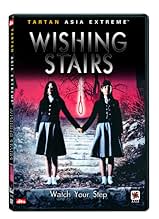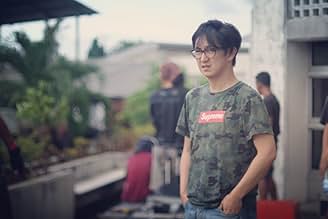VALUTAZIONE IMDb
5,8/10
3362
LA TUA VALUTAZIONE
Una scala che conduce al dormitorio di un collegio remoto di solito ha 28 gradini, ma ogni tanto sembra che ce ne siano 29. Quando qualcuno sale sulla misteriosa scala in più, inizia l'orror... Leggi tuttoUna scala che conduce al dormitorio di un collegio remoto di solito ha 28 gradini, ma ogni tanto sembra che ce ne siano 29. Quando qualcuno sale sulla misteriosa scala in più, inizia l'orrore.Una scala che conduce al dormitorio di un collegio remoto di solito ha 28 gradini, ma ogni tanto sembra che ce ne siano 29. Quando qualcuno sale sulla misteriosa scala in più, inizia l'orrore.
Park Han-byeol
- Kim Sohee
- (as Han-byeol Park)
Jo An
- Eom Hye-ju
- (as An Jo)
Park Ji-yeon
- Han Yun-ji
- (as Ji-Yeon Park)
Moon Jeong-Hee
- Dance Teacher
- (as Jung-Hee Moon)
Trama
Lo sapevi?
- QuizNam Sang-mi was the final candidate for role of Yun Jin-seong.
- Citazioni
Kim So-hie: Fox, fox, please, grant my wish... Let us be together... Always.
- ConnessioniFollowed by Yeogo goedam 4: Moksori (2005)
Recensione in evidenza
This film was a little frustrating in that it's very, very well done in terms of writing, acting, production design and cinematography, but is paced far too slow to manage any real "fright factor" as a horror/ghost story.
I'm well aware that Asian horror films tend to run at a much slower pace than American horror as a general rule, but in this case that "like watching paint dry" pace leaves what could have been a good, maybe even classic film as just "a well-done suspense drama with some light supernatural overtones." With an acceleration in pacing at roughly midway through the film, and the addition - there was a multitude of opportunities for it - of significantly more supernatural content, this would have been a rip-snorter of a horror film that could have made some real tracks in the American market both financially and critically.
Even though as a guy it takes an effort to warm up to the setting of a girls' ballet school, the story is very strong - even excellent - and makes the film worthwhile independently of the horror/supernatural factor, as a study of jealousy vs. self-confidence, subterfuge vs. honest effort, and irrationality vs. reason.
The one weakness I had a little trouble with was the mentally-handicapped student, Hae-Ju, who plays a pivotal role in the story - the fact that she could be present at the school at all. The idea of of a mentally handicapped student being enrolled in an elite and highly-competitive ballet school isn't plausible, unless academic admissions customs in Korea are significantly different than in America. Add to that the fact that she's quite overweight for a ballet student, to the point where, again, it's not plausible that she'd be accepted into such a school.
Those implausibility factors are puzzling in that they're unnecessary. Hae-Ju would have been more believable and a stronger character if she had been not mentally handicapped but simply unpopular, "nerdy," neurotic, or a combination of these, then had become progressively messed-up mentally as the tragic events and malicious treatment by her peers began to weigh on her. (There's some additional confusion that comes into play in the fact that Hae-Ju's character sheds, then regains weight fairly rapidly a couple of times as well as changes her hair color - again as intentional parts of the story - which when combined with scenes in dim lighting make it a little confusing at times to distinguish her from other students.)
Anyway, implausibilities aside, Hae-Ju makes the innocent wish for the dead girl she admired, So-Hee, to be returned to her, and the way the writers make that role play out is masterful: You're not really sure - and the film leaves it intentionally ambiguous - whether Hae-Ju has just completely flipped out and *thinks* she's So-Hee, or whether the spirit of So-Hee has actually merged with Hae-Ju, using her as her malevolent tool. In the hands of a lesser director that ambiguity would have introduced a mess of confusion to the plot, but in this case it not only avoids that trap but adds a nice depth of complexity both to the two characters and to the story as a whole.
It's perhaps unfair or apples-and-oranges illogical to compare "Wishing Stairs" to an American-style supernatural thriller like "Sixth Sense," "Stir of Echoes" or "The Shining," but you can't escape the feeling while watching it that it would have vastly benefited from a marked intensification of pacing and supernatural content as the film progressed. There are some very well-done scenes, like where Jin-Sung finally is confronted by So-Hee's ghost in her dorm room, then in her dorm room closet, that nevertheless fall a little flat - they play out so slowly that the audience has ample time not only to guess what's likely to happen next, but to run through memories of similar scenes from other films and guess at a number of possible outcomes. If the idea is to scare the wits out of people, the scares should be paced rapidly (and artfully) enough to where the audience has no time to anticipate them, much less to mull over other possibilities. Because nearly all of the horror aspect of the film is so muted by the pacing, "Wishing Stairs" could be more accurately classified as "a suspense drama with supernatural overtones," rather than an out-and-out horror film.
Bottom Line: On balance "Wishing Stairs" is a well-made movie that's definitely worth the trip, but disappointing for fans of solid, squirm-in-your-seat fright fests.
I'm well aware that Asian horror films tend to run at a much slower pace than American horror as a general rule, but in this case that "like watching paint dry" pace leaves what could have been a good, maybe even classic film as just "a well-done suspense drama with some light supernatural overtones." With an acceleration in pacing at roughly midway through the film, and the addition - there was a multitude of opportunities for it - of significantly more supernatural content, this would have been a rip-snorter of a horror film that could have made some real tracks in the American market both financially and critically.
Even though as a guy it takes an effort to warm up to the setting of a girls' ballet school, the story is very strong - even excellent - and makes the film worthwhile independently of the horror/supernatural factor, as a study of jealousy vs. self-confidence, subterfuge vs. honest effort, and irrationality vs. reason.
The one weakness I had a little trouble with was the mentally-handicapped student, Hae-Ju, who plays a pivotal role in the story - the fact that she could be present at the school at all. The idea of of a mentally handicapped student being enrolled in an elite and highly-competitive ballet school isn't plausible, unless academic admissions customs in Korea are significantly different than in America. Add to that the fact that she's quite overweight for a ballet student, to the point where, again, it's not plausible that she'd be accepted into such a school.
Those implausibility factors are puzzling in that they're unnecessary. Hae-Ju would have been more believable and a stronger character if she had been not mentally handicapped but simply unpopular, "nerdy," neurotic, or a combination of these, then had become progressively messed-up mentally as the tragic events and malicious treatment by her peers began to weigh on her. (There's some additional confusion that comes into play in the fact that Hae-Ju's character sheds, then regains weight fairly rapidly a couple of times as well as changes her hair color - again as intentional parts of the story - which when combined with scenes in dim lighting make it a little confusing at times to distinguish her from other students.)
Anyway, implausibilities aside, Hae-Ju makes the innocent wish for the dead girl she admired, So-Hee, to be returned to her, and the way the writers make that role play out is masterful: You're not really sure - and the film leaves it intentionally ambiguous - whether Hae-Ju has just completely flipped out and *thinks* she's So-Hee, or whether the spirit of So-Hee has actually merged with Hae-Ju, using her as her malevolent tool. In the hands of a lesser director that ambiguity would have introduced a mess of confusion to the plot, but in this case it not only avoids that trap but adds a nice depth of complexity both to the two characters and to the story as a whole.
It's perhaps unfair or apples-and-oranges illogical to compare "Wishing Stairs" to an American-style supernatural thriller like "Sixth Sense," "Stir of Echoes" or "The Shining," but you can't escape the feeling while watching it that it would have vastly benefited from a marked intensification of pacing and supernatural content as the film progressed. There are some very well-done scenes, like where Jin-Sung finally is confronted by So-Hee's ghost in her dorm room, then in her dorm room closet, that nevertheless fall a little flat - they play out so slowly that the audience has ample time not only to guess what's likely to happen next, but to run through memories of similar scenes from other films and guess at a number of possible outcomes. If the idea is to scare the wits out of people, the scares should be paced rapidly (and artfully) enough to where the audience has no time to anticipate them, much less to mull over other possibilities. Because nearly all of the horror aspect of the film is so muted by the pacing, "Wishing Stairs" could be more accurately classified as "a suspense drama with supernatural overtones," rather than an out-and-out horror film.
Bottom Line: On balance "Wishing Stairs" is a well-made movie that's definitely worth the trip, but disappointing for fans of solid, squirm-in-your-seat fright fests.
I più visti
Accedi per valutare e creare un elenco di titoli salvati per ottenere consigli personalizzati
- How long is Wishing Stairs?Powered by Alexa
Dettagli
Contribuisci a questa pagina
Suggerisci una modifica o aggiungi i contenuti mancanti

Divario superiore
By what name was Yeogo goedam 3: Yeowoo gyedan (2003) officially released in Canada in English?
Rispondi























